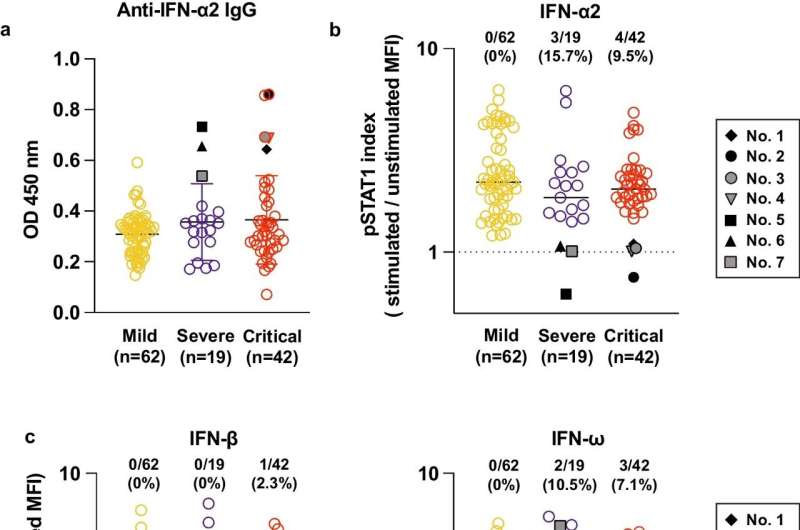This article has been reviewed according to Science X's editorial process and policies. Editors have highlighted the following attributes while ensuring the content's credibility:
fact-checked
trusted source
proofread
Could auto-antibodies be linked to severe COVID-19?

Even though COVID-19 manifests as a mild and short-lived disease in most people, some suffer extremely severe symptoms; in the worst cases, these patients die due to complications such as respiratory failure or thromboembolism. It is well-known that factors such as age and underlying medical conditions like diabetes or immunodeficiencies increase vulnerability to severe COVID-19. However, some patients still experience severe COVID-19 without any apparent reason.
One possible explanation may lie in auto-antibodies, which are antibodies that erroneously target specific proteins produced by one's own body. In normal circumstances, type I interferons (or "t1-IFNs") play a crucial role in the body's defense against viral infections; they interfere with viral replication and help mobilize the immune system.
However, auto-antibodies against t1-IFNs can neutralize their activity, compromising the body's defense mechanisms. While detecting these auto-antibodies was uncommon before COVID-19, there have been multiple reports of severe COVID-19 patients bearing them since the pandemic started. Could auto-antibodies targeting t1-IFNs be more common than previously thought?
To answer this question, a research team, including Lecturer Chiaki Iwamura from Chiba University, Japan, investigated whether and how auto-antibodies targeting t1-IFNs are related to COVID-19 severity by analyzing blood samples from 123 Japanese patients. Their findings were published in the Journal of Clinical Immunology on April 22, 2024. This research was co-authored by Dr. Kiyoshi Hirahara and Dr. Koutaro Yokote from Chiba University, as well as Dr. Ami Aoki from Niigata University.
The researchers first conducted an enzyme immunoassay to detect auto-antibodies to t1-IFNs in the blood samples, and then confirmed whether these antibodies could effectively neutralize t1-IFNs in cell cultures.
"We found that three out of 19 severe and four out of 42 critical COVID-19 patients had neutralizing auto-antibodies to t1-IFNs. Interestingly, there were no characteristic clinical features among patients with auto-antibodies to t1-IFNs," comments Dr. Iwamura.
In other words, there were no pointers in the data as to why some COVID-19 patients developed these auto-antibodies, even when considering previous infections, treatments received, and underlying immune disorders. "Based on these findings, it is difficult to estimate the presence of auto-antibodies to t1-IFNs from the usual blood tests and clinical background," remarks Dr. Iwamura.
To shed some light on how auto-antibodies to t1-IFNs affected COVID-19 patients, the researchers then conducted RNA sequencing and B cell receptor analyses. These experiments showed that conventional dendritic cells and canonical monocytes, two types of white blood cells, exhibited attenuated IFN signaling for patients in which auto-antibodies were present. Moreover, B cells (yet another type of immune cell) in these patients had fewer SARS-CoV-2-specific receptors, implying reduced effectiveness in combating an infection.
Overall, these findings highlight the importance of looking at auto-antibodies to t1-IFNs in more detail when facing viral epidemics. "People with auto-antibodies to t1-IFNs are more susceptible not only to SARS-CoV-2 but also to common viruses such as influenza and to unknown viruses that may emerge in the future," warns Dr. Iwamura.
"Thus, we hope to collaborate with companies to develop a system to detect auto-antibodies to t1-IFNs in the blood. Ideally, we would develop a test to examine the presence of these auto-antibodies in regular health checkups so that people will be able to know whether they have them with little burden."
More information: Ami Aoki et al, Suppression of Type I Interferon Signaling in Myeloid Cells by Autoantibodies in Severe COVID-19 Patients, Journal of Clinical Immunology (2024). DOI: 10.1007/s10875-024-01708-7


















